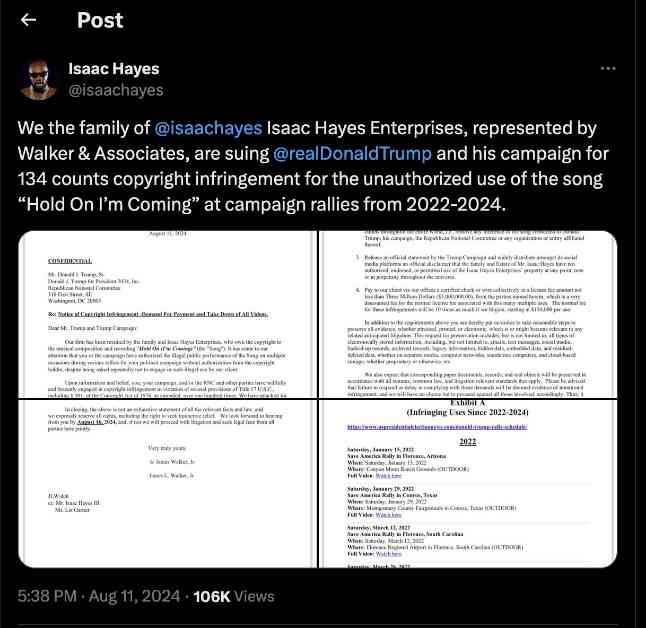The Trump Campaign has been facing backlash from artists for unauthorized use of their music during various rallies and events. The family of singer-songwriter Isaac Hayes is the latest to join the list of artists threatening to sue Donald J. Trump for using the song “Hold On (I’m Coming)” without permission. The family claims that the song has been used over 100 times without authorization, amounting to a requested payment of $3 million for copyright infringement.
The letter sent by the family’s attorney, James Walker, demands that the Trump Campaign cease all use of the song, remove any video clips featuring the song, issue a statement clarifying the unauthorized use, and pay the discounted license fees. The family has threatened to take legal action in federal court if their demands are not met by a certain deadline.
It is worth noting that the Hayes family has been requesting Trump to stop using the song for two years with no success. This adds to the growing list of at least 35 artists who have spoken out against or sent takedown notices for unauthorized use of their music during Trump’s campaigns.
In a similar vein, Sam Moore of Sam & Dave also opposed Barack Obama’s use of “Hold On (I’m Coming)” during his campaign in 2008. Moore expressed that while he was thrilled to see progress in the country, his vote was a private matter. Interestingly, Moore performed at Trump’s inauguration in 2016 despite his previous stance.
Recently, Trump has faced criticism for using Celine Dion’s iconic song “My Heart Will Go On” from the Titanic soundtrack at his rallies. Dion’s management team and record label have confirmed that the singer did not authorize or endorse the use of the song, questioning the decision to use a song from a movie about a doomed ship at a campaign event.
This situation highlights the importance of obtaining proper licenses and permissions for using copyrighted music in public events and campaigns. Failure to do so can lead to legal repercussions and damage relationships with artists and their representatives. It serves as a reminder for campaigns and events to be mindful of copyright issues and respect the rights of creators to avoid potential lawsuits and controversies.















